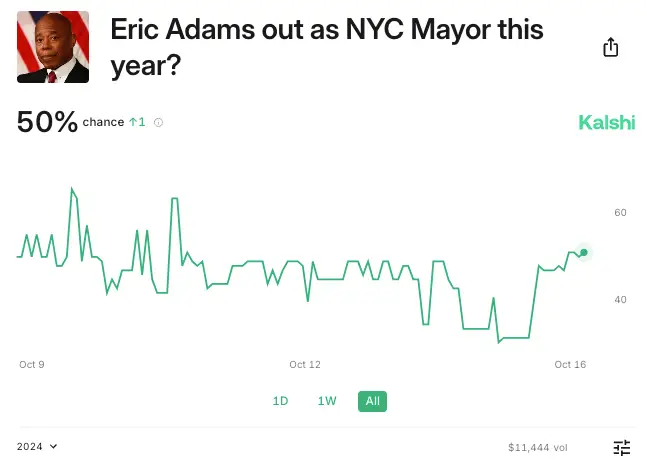As federal corruption charges loom over New York City Mayor Eric Adams, speculation about his potential early departure is intensifying.
On various prediction platforms, the market “Eric Adams out as NYC Mayor this year?” has seen increased liquidity. On Kalshi, the probability of Adams not finishing his term hovers around 46%, while on Polymarket, it sits at approximately 30%. This divergence highlights the complexity behind a seemingly straightforward question.

It’s easy to assume that the probability of Adams being found guilty correlates with the probability of him leaving office by the end of the year. However, these are two distinct outcomes that do not necessarily reflect one another.
While the indictment paints a damning picture, there are several factors that suggest Adams is unlikely to be out of office by year’s end.
Here, we explore four key scenarios that could shape Adams’ political future—and why each presents significant challenges to the idea of an abrupt departure.
1) A Guilty verdict – but when?
One scenario that could lead to Adams’ removal is a guilty verdict in his federal trial. The 57-page indictment accuses him of bribery, conspiracy, wire fraud, and soliciting campaign contributions from foreign nationals. The charges are severe, but even in a worst-case scenario, the judicial process is likely to take much longer than traders might expect.
The U.S. Attorney’s Office has until Oct.18 to respond to Adams’ lawyers, who filed motions seeking to dismiss the entire case. The defense has until Oct. 25 to file additional paperwork, with arguments scheduled for Nov. 1.
Federal convictions can take months, if not years, to conclude, due to the complexities of trial procedures and appeals. Therefore, while the probability of guilt may rise as the case unfolds, the probability of Adams being ousted by the end of the year remains low.
2) Voluntary resignation – not likely
No matter what happens, he is going to be in denial until the last possible moment. He probably will even run for a second term.
Sateesh Nori, NYU law professor
A second possibility is that Adams may choose to resign voluntarily. However, this scenario also appears improbable.
Despite a growing number of resignations in his administration—including those of Kristen Edgreen Kaufman, a member of the Mayor’s Office of International Affairs, and David Banks, Chancellor of New York City’s public schools—Adams has remained resolute in his decision to fight the charges. In a statement following his indictment, Adams emphasized his commitment to fight the case “with every ounce of my strength and spirit.”
Sateesh Nori, a professor at NYU Law, believes that Adams might follow the playbook tactics of former President Donald Trump, denying the charges and maintaining his innocence while using his political position as a platform to defend himself.
“No matter what happens, he is going to be in denial until the last possible moment,” said Nori. “He probably will even run for a second term.”
During the October hearing, Adams’ lawyer expected the trial to start and end in March 2025, as reported by ABC, giving Adams enough time to secure a spot on the reelection ballot. This timeline alone suggests that Adams could remain in office well beyond Dec. 31, even if the evidence against him is strong.
There is no legal requirement that forbids Adams from re-entering the mayor election race unless he is convicted of a felony. As long as the trial is ongoing and he is not formally found guilty, Adams could very well remain in office and seek re-election in 2025.
3) Governor intervention – uncertain terrain
Under New York law, Governor Kathy Hochul can remove the mayor from office under certain circumstances. As of Monday, Governor Hochul has only expressed support for the mayor.
The exact quote...@GovKathyHochul talks about her team being "integrated" and "working closely" with the @NYCMayor pic.twitter.com/RW6G9S3ckL
— Henry Rosoff (@HenryRosoff) October 14, 2024
While Hochul’s intervention is theoretically possible, the political ramifications of removing a sitting mayor cannot be underestimated. Historically, then–New York governor Franklin D. Roosevelt tried to remove then-Mayor Jimmy Walker, who was involved in a corruption scandal, but Walker resigned before the proceedings reached an end.
Without significant public pressure or a clear legal mandate, it is unlikely that Hochul will force Adams out of office before the legal process has run its course. Moreover, even if the governor were to take this action, the bureaucratic and legal hurdles involved in removing an elected official could extend the process well beyond the end of this year.
4) Internal whistleblower – wild card
The final scenario involves the potential for an internal whistleblower from Adams’ administration to come forward, forcing the mayor into a resignation. While this is the most speculative of the four scenarios, it cannot be entirely dismissed. Historically, whistleblower revelations have toppled political figures when the information disclosed proves too damaging to ignore.
In Adams’ case, however, none of his administrative members who resigned one after another have come forward as whistleblowers, nor is it clear that such a revelation would lead directly to his resignation. Adams’ public stance thus far has been one of defiance, and it is unclear whether any internal embarrassment or additional revelations would sway him to step down before year’s end.
Are prediction markets overconfident?
While the charges against Adams are serious, it seems like the odds of him leaving office before the end of this year are lower than what the top prediction markets suggest. Each of the four potential pathways—whether a guilty verdict, voluntary resignation, governor intervention, or an unexpected whistleblower—faces significant legal, political, or procedural obstacles.
Traders may be overestimating the speed and impact of these developments. While the probability of Adams being found guilty may increase as the case progresses, the likelihood of him being out of office by year’s end remains slim.

























